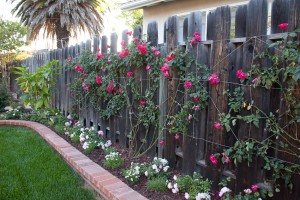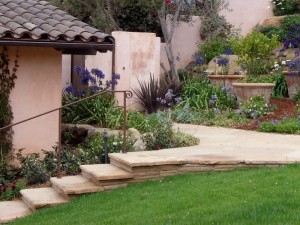Landscaping for Privacy Using Screens, Lattices, Fences, and Block Walls
If, in your search for landscaping for privacy, you seek something a bit more substantial, there are many excellent options for installing hardscape solutions to achieve backyard privacy.
1. Screens
The least expensive and permanent way to provide privacy for a deck or yard is the screen. This is an easy weekend “DIY” project. Screens are accessible through many different retail stores from hardware stores to places like Pier One and Cost Plus World Market. They vary in size, color, design, type, and material.
Gardens that are designed to evoke the calming state of a Zen garden benefit from the use of a screen for privacy. They can be beautiful and authentic. Our one suggestion is that when choosing a screen for privacy, you pay close attention to the kind of material of which it is made and keep in mind the way the weather will affect it.
For example, a landscape that faces the western sun or that is particularly wet will age your screen faster than a shady dry area. Always make sure that the screen material you purchase is meant for outdoors. In most cases, the manufacturer will note this on the box or in the store.
2. Lattices and Fences
Lattices can also be “DIY” projects, if purchased at hardware stores. A lattice is any ornamental framework made of a crisscross shape out of an arrangement of crossing “laths” or slight strips of material. They come in prefabricated sizes and thickness and are usually ready to be painted. Be sure to treat the material with a sealant and primer before painting.
In our landscapes, we prefer to use lattices as part of fencing structures for privacy. We build our own lattices, and we like to combine them for a custom look that will remain beautiful for many more years then the prefabricated versions.
We often use them near hot tubs or in areas where a screen is more preferable than the closed look of a fence. They can be particularly effective in “secret garden” type landscapes. They tease the senses with a peek at the opposite side while still providing shelter from the elements. They are also great options for sweet scented vines like climbing roses, sweet peas, and pink jasmine.
If a fence is required for privacy, our best tip is to use what is called 1 inch x 6 inches dog-eared redwood or cedar planks. We use closed fences because they block the sound better than lattices or screens. They are a more natural way to provide privacy than walls, but provide more security than hedges or “living walls.”
Note: If you are concerned about the materials being used for fencing, don’t be. These days the wood used for fences is farmed. Old growth is being protected by conservation organizations. Just be sure that if you buy wood materials from abroad, it is sustainably farmed and harvested.
3. Walls
Although they are the best choice for reflecting sound and providing privacy, we generally use walls as a last option for privacy because they are the most expensive choice, both in labor and in materials.
Our favorite walls choices are:
- · Cobblestone
- · Sandstone
- · C(oncrete)M(asonry)U(nit) Block Walls
As we’ve previously mentioned, we love to install rock walls because they put us in touch with our Irish roots. They are not, however, the best choice for privacy as they are prohibitively expensive to install for height. They are best for use on hillsides to shield a property against slides and sound.
Let’s look at the installation of CMU block walls.
When installing CMU wall, we recommend that a homeowner have the wall engineered for safety. Get a design to specify installation. For a wall over three feet, they also need to be permitted and laid out according to specification.
The basic installation of a CMU wall is as follows:
- · Install a footing
- · Install block levels (depending on height)
- · Install continuous rebar vertical and horizontal through the wall
- · Fill cells with concrete
- · Build wall to desired height
- · Finish with capping (stone or concrete)
- · Leave wall natural, stucco, or install a facing on the front
Refer to our “Walls” section of our website has more information on installing walls or call Bruce at (805) 765-2553 for more information.
One last note: Remember that any permanent structure over 3 feet must be permitted through your city.
Give us a call or fill our a form to Request a FREE 42 Point Landscape Evaluation!
We’d be happy to assess your privacy options and explore your options.







